Emily Richardson's Blog
November 30, 2015
The ball that lost its bounce
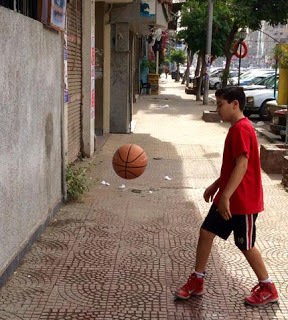
In Egypt, the disparity between the haves and the have-nots is so great that it is easy for small moments to hold big lessons.Last evening (also known as ‘afternoon’ in Egypt), the boys are I were on our way to the club for Ziad’s basketball training. Nazar, who was coming along to shoot hoops, wanted to stop at the local tyre shop on the way to pump up his ball, which was slightly deflated and had lost much of its bounce. We weaved our way through the streets towards the tyre shop, Nazar bobbing happily along with a couple of pounds in his pocket to give as a tip to the man who would dispense the air. Arriving only to find the shop closed for the day, disappointment immediately took hold as Nazar realized that he would now be stuck with a sub-par ball for the night. There were only a few seconds to turn this around before disgruntlement set in. “It doesn’t matter,” I told him. “You can just practice your shooting tonight.”“But I still have to dribble the ball up to the net,” he grumbled.“Sometimes in life you just have to make do,” I said. “Maybe Captain Islam (the coach) can pump it up for you when we get there.”His shoulders hunched over as he shuffled along in discontent. “I don’t know if he has the thing to stick in the ball to pump it up.”“Well maybe you can use one of the club’s balls for tonight.”“Their balls aren't very good. Now I'll have nothing to do while Ziad's training.” He wasn't sure who to blame but it was clear a large dose of grumpiness would be upon us momentarily.“Look,” I told him, “this is a less-than-optimal situation, but there’s nothing we can do about it tonight. Maybe this happened to remind you to be patient. You have a great ball and we’ll put air in it tomorrow. You only have to use a flat ball for one night. Some of the kids always have to use a ball that isn't as good as yours. Plus, you have lots of people who love you. And lots of people who you love. You have a full tummy. You have a great life.” He took a few seconds to think about it. “I am pretty lucky. I can just practice my layups tonight.” A couple more seconds of thinking and then, “Can I keep the two pounds to buy something?”“Sure. See, something good has come out of it. Just remember that you are luckier that 99% of kids in Egypt. Always try and look at the big picture.”“It’s actually good that this happened,” he said “because now I have two extra pounds to spend at the kushk.”And his bounce was back.
Published on November 30, 2015 12:29
June 16, 2014
"My overseas connection" by Nazar
My 8-year old son, Nazar, also spoke in the regional Multicultural Public Speaking competition. He talked about his connection to Egypt, including his friends and some of the things he loves about it.
Today I would like to talk about my overseas connection.
Many people in Australia are from other countries. For example, me! Well, half of me. One half of me is from Australia and the other half is from Egypt. Egypt is a country in Africa.
The main language in Egypt is Arabic. My brother and I always speak Arabic with our dad, no matter where we are. One Egyptian word is “Iziak”. That means “hello”.
There are so many awesome things I love about Egypt. For example, the people are really generous. They are also very funny and are experts at making jokes.
My best friends in Cairo are Zeinab and Mohamed. They don’t have a lot of money. They live in the garage of the building next door.
They are so kind and happy, even though they don’t have a proper house to live in. We hang out together a lot. They are fantastic at inventing new games. One fun game we invented is a type of hide-and-seek, where we hide in the trees. It’s called Hide and Tree.
Kids in Egypt also love to play soccer in the street. We all meet in the park outside our house after school. On the weekends, we sometimes play until 11 o’clock at night!
Sometimes we get two pounds from our grandparents and go to the kooshk to buy chips and chocolate. A kooshk is a very small corner shop that stays open until about 1 o’clock in the morning!
There are also some really nasty kids in our street. They love to pick fights with all the other kids and cause problems – just for fun. They have heaps of money. They prove that having money doesn’t make you better than anyone. And money doesn’t make you a better person. Because they have heaps of money and they’re bullies.
Kids like Zeinab and Mohamed prove that being a good person isn’t about how much money you have. Because they don’t have that much money and they’re fantastic.
If scientists are ever able to make a time machine, I would travel back to Ancient Egypt because I want to find out how the pharaohs built the pyramids. We can learn a lot about ourselves from our past.
A lot of people in this school think that Egypt is just desert, mud huts by the River Nile and people riding camels in the street. But they are just stereotypes. Egypt has much more than those things.
Egypt has cars, trucks, buses, trains, roads, apartments, parks, theme parks, I phones, I pads, schools, malls, shops, airports, markets and cities. It just goes on and on and on.
Do you still think the same about Egypt now?
Published on June 16, 2014 01:25
June 14, 2014
Ziad's speech on stereotypes
My 11-year-old son, Ziad, spoke about stereotypes in the regional Multicultural Public Speaking competition. I'm very thankful to have a boy who is able to think for himself and come to his own conclusions about people:
I’d like to talk to you today about stereotypes.
There are stereotypes all over the world. For example, all boys are messy and all girls are fussy about their hair. These are both common gender stereotypes. But what is a stereotype exactly?
A stereotype is an oversimplified image of a particular type of person. It’s a commonly held view about a group of people, such as a nationality, a social group, or a religion. Stereotypes are often incorrect or offensive. They can be positive or negative.
For example:· All Italians are good cooks.· All Muslims are terrorists.· All black people are great basketball players.· All French people are romantic.· All men like cars.· All policemen eat donuts - which I know is not true, because my dad works with the police and he doesn’t eat donuts. Well, not that I know of.
People who believe in stereotypes tend to believe what the internet or the media tells them, or what other people tell them based on their experience, which is often wrong or twisted. For example, if I have a Chinese friend who is fantastic at maths, I might think that ALL Chinese people are fantastic at maths.
Stereotypes are wrong because they make a judgement based on appearance, not on what a person is really like inside. For example, maybe you meet an American at some point in your life. And you don’t want to be friends with them because you have heard that all Americans are loud and annoying. You may have met the person who could have been your best friend or partner for life. But because you judged them by a stereotype, you missed that chance.
Stereotyping is not only hurtful, it is also wrong. It can cause bullying from a young age. It can also lead people to live lives driven by hate. And it can cause the victims of stereotypes to be driven by fear.
One way we can stop stereotyping is to help people realize that deep down we are all the same. And, at the same time, we are all different.
Stereotyping puts people from a particular group under one label that doesn’t apply to all of them. And probably not even most of them. Stereotypes are based on misconceptions. They come from a gap in knowledge or a fear of something that is not properly understood.
They leave no room for individuality. The problem with stereotypes is they assume that groups of people are naturally likely to behave in a certain way. They pigeonhole all people into one personality trait.
Going back to the examples, I would like to make some points about why people should not stereotype.
The first stereotype: All Italians are good cooks. I’m sure they are not ALL good cooks. They have many other talents. For starters, Leonardo da Vinci was a famous Italian painter and Christopher Columbus was a great explorer. They were both Italian.
The second stereotype: All Muslims are terrorists. Well, obviously not ALL, because I am Muslim and do I look like a terrorist? Come on – I don’t even have a beard!
The third stereotype: All black people are great basketball players. Here are some examples to prove this is not true. Nelson Mandela, a famous freedom activist. Usain Bolt, the fastest man in the world. Martin Luther King Junior, a great example of a man who fought for the rights of people who happened to have dark skin.
To wrap it up it, I believe that stereotypes are wrong. Everyone should try to do all they can to stop stereotypes forever. We all have our part to play in making this happen, starting with ourselves. We should respect our own minds and think for ourselves. We should judge people only on their personality, how they act and how they treat us.
Published on June 14, 2014 03:38
April 10, 2013
Egypt is a journey
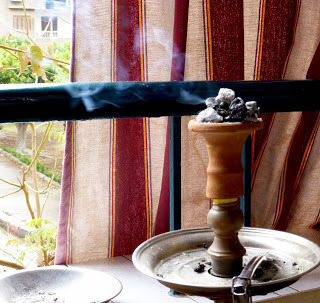
“I can’t imagine why anyone would be sad to leave Egypt these days,” someone said to me.
Well, I'll tell you why. It’s sad because Egypt is a journey, not a destination. It’s a place that reveals itself slowly over a long, long time. It is found in the details, in the minutiae of everyday life, hanging in the air waiting to be walked through so it can seep slowly through your skin and into your heart.
It’s in the calloused hands of the butcher as he prepares your meat. It’s in the rising fury of an argument that reaches a swift crescendo before evaporating into nothing. It’s in the smoke wafting around the dora mashwy carts. It’s in the boys who walk with their arms draped around each other and the girls who link arms with their friends.
It’s in the voices of the people, who all talk at once and over the top of each other and yet still manage to generate a sequential conversation out of the jumble of words. It’s in the play of the bawab’s children who can invent really good games on the spot (or so I’m told by my kids).
It's in the scent of the stifling, polluted air that hits you in the face when you step beyond the glass enclosure of the airport.
It’s in the dust that settles in your skin and hair and in the dirt under your fingernails. It’s in the tone of voice of the taxi drivers when they talk about their love for their country, even when she’s at her most unlovable.
It’s in the constant little frustrations when you’re there and the longing for it when you’re somewhere else.
Egypt is like a sweet, fleshy pomegranate that you have to tear open with your bare hands. It's an intertwining mess of tart, white, unsavoury pith and glistening scarlet juice pods that burst with sweetness if you have the nerve to take a bite—the sweetness that you'll miss out on if you worry about getting the juice on your clean shirt.
Published on April 10, 2013 22:46
March 8, 2013
Collecting treasures in Cairo
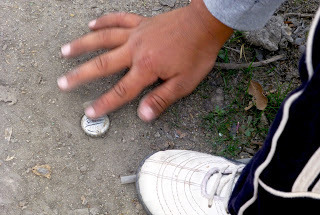
The other day, the boys and I were going for a long walk, just for the fun of it, which is something of an anomaly in Cairo. At least that's how it started out. And then, shortly after we started, they decided it was also going to be a treasure collecting expedition.
Being still of the age where certain scraps of discarded paraphernalia are considered things of great consequence, they decided to amass as many bottle tops as they could. Every few steps they spied another one, and the challenge was on to find one they didn’t already have. The most valuable were those they had to get down on their hands and knees to dig out with a stick, followed closely by the ones covered in rust, which were considered antique and therefore priceless. After two blocks their pockets were full and we had to stop at a kiosk to get a couple of plastic bags to hold the loot.
When we finally got home a couple of hours later, we had a bucketful of bottle tops, which we soaked in detergent and dried off. The second leg of entertainment then followed by lining them up according to colour and brand. Four hours of merriment and not a penny spent.
This is the Cairo equivalent of collecting seashells. My 7-year-old told me it was the second best day of his life, succeeded only by the day he went to Jambaroo, a local water park in Australia.
Egypt, the land where small joys can be found in the dust.
Published on March 08, 2013 03:49
March 7, 2013
Egypt is the place...
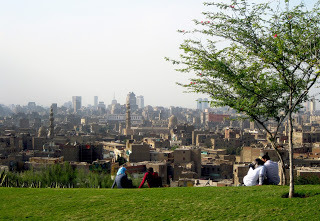
People constantly ask me, “…but why do you love Egypt so much?” And it’s a question I’ve always had trouble answering, because I never really knew why. It was not something to be put into words; it was a feeling. But over time, the reasons have crystallized in my mind and I will tell you exactly why I love it.
There are a million little reasons, a million little moments, and the sum of their parts make up the whole.
I love it because of the sense of community that is ever-present in a country of 90+ million people where, even when I didn’t know a soul, I felt as though I belonged. Because if my car breaks down there will be a handful of people pushing it to give it a clutch start without even having to be asked. Because the fruit seller tore open a pomegranate with his hands to show me how to eat it. Because the young guy in the kiosk offered my son his hawawshisandwich when he randomly commented how much he loves hawawshi. Because the parents in the park invited my boys to play ball with their children and then insisted that they keep the ball at the end of the game. Because my boys now know what it means when someone has a white heart. Because when I told the waiter in a café that I need my coffee really strong and really hot, he tapped under each eye to say, “Min einaya”.
Because when my children give someone with nothing a couple of pounds they receive heartfelt blessings for God’s protection. Because being a mother is not only enough, it is revered. Because every time I speak to anyone they wish me peace. Because every time I talk to someone on the phone they ask if I need anything. Because when I order shay bilaban in a coffee shop they heat the milk for me. Because when I speak Arabic with an accent the taxi driver asks if I’m Lebanese. Because here I learnt that sometimes bad things happen to prevent something worse from happening. Because I left a jacket I loved in a taxi and was told that it happened because somebody else really needed that jacket much more than I did. Because my boys have learnt that the bawab’s kids are often kinder and more polite than the kids who have everything. Because here I finally worked out how to reconcile the concepts of fate and freewill. Because the little things can mean everything. Because being in Egypt makes me see life in its proper perspective.
Because Egypt is the place where I feel more like myself than anywhere else.
Published on March 07, 2013 00:47
March 5, 2013
Balcony life
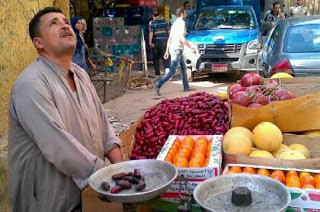
It’s early March and every now and then a midday breeze drifts across the balcony. My first coffee of the day is disappearing quickly down my throat, sipped from one of the new glass mugs I bought yesterday from El Tawhid wa el Nour (the Egyptian equivalent of Target or K-Mart; not a fancy people place, but we love it).
You can hear a microcosm of life from Egyptian balconies, especially if they’re on the lower floors of the building. The voices of children playing. Radio music wafting past somewhat statically, with Abdel Halim and Fayza Ahmed interspersed with Wust El Balad and Mohamed Fouad, depending in which direction you turn your ears. The bikya man buying unwanted household items, the aysh man selling bread, the ghazl el banat man selling fairy floss, men and women selling vegetables on the corner.
Sitting here, it’s easy to imagine that things have changed for the better, that the people are happy, that the forces in power are bettering the country day by day, minute by minute, propelled by a deep love of their country and their people. And then reality returns and the picture is not what it should be two years after the revolution. The hope that was here even a year ago is almost gone, if there is any left at all, and the little that is left hangs by a thread. Many who were struggling for change just want to leave; to get on with their lives in a place where they count for something, where their daily struggles and daily contributions count for something. But who can leave, and who should have to?
The call to prayer cuts through the air, a constant reminder of the presence of something greater than yourself in this country that seems to have been abandoned by God. I keep trying to reassure myself that, as it says in the Qur’an, ‘Everything is written’ and there is some kind of beautiful plan in store for Egypt that will in due course come to fruition; that the fabric of this country will be woven into what it should be by the people, who deserve to have their vision for it materialized.
I wonder how those of my parents’ and grandparents’ generations feel. The ones who knew Egypt when she was free—or at least free by comparison to what she is now. When cosmopolitan was the norm and every day held a little romance, a little poetry. When she was Om el Donya personified. And I can’t imagine the sadness they must feel, knowing what once was and seeing what now is. Knowing what has been lost and wondering if it will ever be found.
Sitting on the balcony, it is not difficult to imagine. And if it can be imagined, it can happen, isn’t that what they say?
Published on March 05, 2013 08:28
November 14, 2012
Halfway to being a man
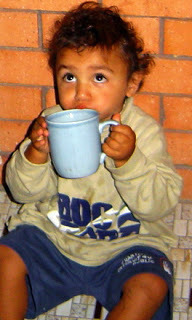
I always thought the whole double digits thing was a bit overrated. But then today – and I’m still not sure how it happened – my little boy turned ten.
People try to warn you about it. When you have a newborn baby, everybody tilts their head knowingly and tells you to “savour this time” because “it’ll be gone in a flash”. Don’t blink, because “they grow up so quickly”. But when you’re waist deep in nappies and Play School you can’t possibly see how that could apply to you. And then your baby turns ten. And you start to believe it.
Last year, when he turned nine, I thought, Good grief, my little person is halfway to being an official grown-up! At least in Australia and Egypt. That was enough to give me pause, but easy enough to brush over. And now he’s ten. In one year, he’s gone from being half an official grown-up to half a fully-fledged young adult. He’s halfway to being waist deep in a university degree. Or an apprenticeship. Or possibly his second gap year. Whatever path he chooses, he’ll be entrenched in adulthood. The odds are high that he’ll be out of my house and living elsewhere. And that’s a sobering thought. A thought that brings a lump to my throat and makes my chest constrict a little. A thought that causes my mind to flood with questions. Have I been a good enough mother? Am I raising him well enough? Am I enjoying my time with him enough? Do I sweat the small stuff too much? He’s at the age where I can see glimpses of the man he is on his way to becoming. The man I hope he will be. It’s infused in everything he does. It’s in the way he moves. The way he tilts his head. The way he expresses his opinions. The way he treats others. And yet, for now, he’s still a little boy. For now, but not for much longer. We have our children for such a short time, in the big scheme of things, before we have to release them into the world. So now, with ten barging its way in through the front door without even knocking, each moment feels more weighted with significance. Every action seems more like a chance to impact this boy who is on the fast track to manhood. But for today, I’m not going to think about it. I’m just going to read to him for a bit longer when he asks me to, as he always does when it’s time for lights out. Because one day, all too soon, he won’t ask any more. Because today, he’s still just my little boy.
Published on November 14, 2012 00:58
May 20, 2012
Raising Muslim boys
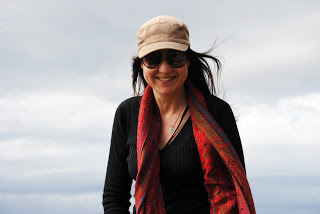
STORY and PHOTO: Katrina Condie
MAKING IT WORK: Australian woman Emily Richardson married an Egyptian Muslim man 11 years ago and the couple are now raising their two sons to be “respectful and accepting of other people’s beliefs”, splitting their lives between the bustling metropolis of Cairo and a pristine beach hamlet on the South Coast of NSW.
Raising Aussie Muslim boys to ‘be part of the solution’ “Our similarities are much greater
than our differences…
if more people
could get into that mental space
the world would be much better for it.”
Emily Richardson didn’t know how her parents would react when she rang to tell them she was getting married.It wasn’t the fact that she was on the other side of the world, or that she was marrying an Egyptian man - it was that he was Muslim.Emily grew up on a farm in New South Wales, Australia, where she, her three brothers and their parents attended the local Presbyterian service every Sunday and said grace before dinner each night.With a strong Scottish heritage, Emily’s upbringing was far from multicultural, attending an Anglican high school and an all-girls Christian school in Sydney.In fact, she had no idea about the Middle East and no exposure to Islam. “I had absolutely no understanding of the culture and it wasn’t really on my radar. There was no frame of reference for me.” The stereotypical perception of the Islamic religion – bearded men and oppressed women - fuelled Emily’s trepidation in telling her parents.But, as it turned out, the family was supportive of her decision and they were interested in learning more about Muslim beliefs and customs. "I thought mum and dad might freak out - maybe they did and just didn’t say anything," Emily said."I’m sure they had many reservations about the situation, stemming from the fact that they knew little about the culture and hadn’t met Ahmed, but I didn’t doubt that they’d be supportive of us and welcome him into the family, which they did."Some of Emily’s friends weren’t so supportive, warning her she was making a huge mistake."I did have a couple of friends who were very concerned that I was getting into a situation that would backfire badly for me," she said. "One friend was horrified and tried to talk me out of it."They had met two years earlier when Ahmed spotted Emily through the crowd at a rooftop party in Cairo, where she had just taken up a position teaching English in 1999. "As legend has it, he saw me from across the other side of the roof and decided we had to meet," she laughed. "He was very open and friendly - and very funny. We were great friends and had a very easy relationship from day one."A few weeks after meeting, Ahmed took Emily to meet his family. They warmly welcomed the Australian woman who was still finding her feet in a foreign land.“His family were very accepting of me,” she said. “As Christians and Muslims believe in the one God, it wasn’t a problem.“I’m sure his family had some concerns about the cultural differences at first, but they realized pretty quickly that Ahmed was serious about me and they got on with getting to know me.“They are all very open-minded and easygoing. Now I feel just like one of the family.”It was a similar story when Ahmed came to Australia and met Emily’s parents and brothers.The couple spoke early on about children and how they would be raised. “It’s very, very important to have all the big discussions prior to marriage,” she said. “What religion the children will be and what the expectations of both partners are.”Now living with two young sons, Ziad and Nazar, in Australia, with her parents and one brother just around the corner, Emily and Ahmed are lapping up the Aussie laidback lifestyle.“Ahmed loves it here,” Emily said. “We spend a lot of time at the beach and going for long walks. Ahmed is a great dad and does a lot with the boys.”But every day she’s in Australia, walking on a deserted pristine beach, surrounded by bushland - a life that many would give their right arm for - Emily is dreaming of being back in Cairo.Egypt has dug its claws in deep.The family spends about three or four months a year in Heliopolis, a middle class suburb of Cairo. “When I’m there, I feel like I'm in the centre of the universe, and when I’m away, I can’t wait to go back,” she said.“I like it here, in Australia, but it just doesn’t touch me like Egypt does - the smells, the activity - all your senses are bombarded. It’s so vibrant, pulsating and exhausting and life is lived in the moment. I love the whole Egyptian culture, the music, language, the food. You walk outside and there are kids playing soccer in the street, men selling bread, men selling fairy floss, women selling vegetables on the corner. Even if you’re completely alone, you feel a part of the community around you.”She said the boys thrive on being exposed to the culture and the language. “Nazar loves all the stray cats in Egypt and Ziad loves going to the markets,” she said.“They see extreme poverty and interact with kids who are dirt poor and kids who are very well off.“They see that money doesn’t make a good person, through their interaction with these children and the dynamics in their little group of friends and acquaintances - life for the majority of people in Egypt is a struggle.”Emily said many Westerners still have a distorted view of the Middle East, its people and its culture.She said the people there have an “almost magnetic quality” about them.“Egyptians possess a certain indefinable quality that is really difficult to describe - even in their darkest moments, of which there have been many in the last ten years. “And the Egyptian sense of humour is unbeatable - Egyptians are hilarious.”Despite the common belief that Muslim men who marry foreign women demand their wives convert to Islam, Emily explained that, “It’s expected that the children will be Muslim but other than that no real conversion of beliefs is expected - although it differs depending on the socioeconomic status of the family, and most families would greatly hope that the woman would adopt their beliefs for her own sake.”She said at no time has she been asked to convert to Islam and she has never worn a headscarf while in Egypt - expect when entering a mosque.“There is a definite stereotype about not only women who convert to Islam, but all Muslim women being dominated and subservient,” she said.“Of course there are many cases where this is true, but in my experience it is in no way the norm,” Emily explained.“It usually stems, in my opinion, from a certain interpretation of the Qur’an by a certain type of man that in no way represents the moderate Muslim man - at least none that I know.“Historically, Muslim woman have had more rights for far longer than women in the West, if the religion is followed correctly.“The right to vote and the right to own property are two that spring to mind.“My own mother-in-law, for example, was a lawyer who worked her whole life until she retired a couple of years ago.”Prior to commencing work in Cairo, Emily had back-packed through Egypt five years earlier while travelling with a friend. She had no idea what the country would be like, but was instantly drawn to the place and its people.Looking back, she said she feels “almost embarrassed” about the way she used to think. “When I think about when I was growing up and in college, I didn’t know what Islam was and had very little exposure to multiculturalism. I feel like I was quite judgmental about a lot of things without really understanding them.“I don’t know where the ideas came from, or why I thought that way. I just did.”Emily believes many people throughout the world still think like that.“There is a lot of bias against Muslims and Arabs,” she said.“Some of the things I read and see in the media just leave me shaking my head because they are so inaccurate and so overgeneralized.“I can’t relate them at all to the people I know.“It makes me sad more than anything because I know this culture and it is amazing, rich and multi-faceted.”Now living in a small town, where they are the only Egyptian family and the boys are the only Muslim students at their school, Emily said it is important for her and Ahmed to raise their children without bias and with an understanding and acceptance of other people’s beliefs, religion and customs“We try to instil in them that other people have different beliefs and that’s okay because everyone is free to choose and follow what is in their heart,” she said.“My kids being accepting and open-minded is one of the most important things to me and it’s something we often talk about with the boys.“There are so many stereotypes out there that are just wrong, so it’s important to me that my boys be part of the solution - and not part of the problem.“I want them to understand that they’re in a position where they’re representing their Egyptian culture when they’re here in Australia and their Australian culture when they’re in Egypt and that people will judge others based on their behaviour.”“Our sons know that they are Muslim and they know that their grandparents in Australia are Christian,” Emily said. “They also know that we all believe in the same one God.“They know that the main difference is that in Islam Jesus is a prophet, while Christians believe that he is the son of God.”The family still celebrates Christmas and Easter together, though if they are in Egypt at the time they are more “low key affairs”. They also observe Ramadan, when Ahmed and Emily fast, and celebrate the two Eids (Islamic festivals).Emily is this month celebrating becoming an Egyptian citizen. “I have felt Egyptian for so long anyway that it’s nice that it’s now official,” she said.With a brother-in-law jailed for a year for speaking out against the military, the political system is a subject close to Emily’s heart and she is pleased she will have the right to vote in future presidential elections.“Egyptians have been oppressed by the ruling regime for over 30 years, with little freedom of speech and terrible human rights abuses,” she said.“There’s an ongoing struggle to meet the demands of last year’s revolution, but there are so many factors at play, so much corruption and so many people trying to protect themselves that it seems not much has changed yet. But we still have faith…”She said, contrary to widespread belief and “media hype” many ordinary Muslims and Christians live harmoniously in the suburbs of Egypt. “Most Egyptian Muslims I know have Christian friends, and vice versa,” she said. “I don’t see the divide as being on the street level but something that is exacerbated higher up.”Emily believes a solution will be found to the problems being faced by Egyptians and she also feels if people in general were more accepting and respectful of others’ beliefs, the world would be a better place.She said her cross-cultural relationship was a “microcosm of the larger picture.”“I am very into East-West relations and bridging the gap, so to speak. And with relationships such as ours, you quickly realize that our similarities are much great than our differences,” she said.“And it’s such a simple realization that more people would have if they were exposed to ‘the other side’.“The bottom line is that we’re all people, we all care about the same basic things.“If more people could get into that mental space the world would be much better for it.”***Emily’s “addiction” to Egypt inspired her first novel called The Nile is a Road, which has been published in Egypt and will soon be available in Australia.It’s the story of two foreign girls who travel to Cairo together. They only plan to stay a week and see the pyramids. However, once there they meet and befriend some local men and find that they don’t want to leave.“The book is about their experiences in Cairo and the effect the people have on them, with a lot of cultural references and anecdotes,” Emily said. “Cairo is filled with so many stories that I knew I would set my first book there. I love Egypt so much that I want to tell everyone about it and I hope that my book does this.”
Published on May 20, 2012 22:08
December 6, 2011
Moments: Hawawshi
This is the sort of thing I love about Cairo: You're out for an afternoon walk. Feeling a little thirsty, you stop at the nearest kiosk to buy a bottle of water, only to be overcome with the most amazing and unmistakable aroma drifting towards you from inside. Your first thought is proven correct as you see the young guy sitting behind the counter opening the silver foil covering his hawawshi, the steam rushing out.
Hawawshi is just one of those things that is so good (unless you're a vegetarian, in which case take no heed) that it can't really be adequately described. It's made from baladi bread, Egypt's version of pita bread (but much better) stuffed with spicy minced meat, brushed with oil, wrapped in aluminium foil and baked for about half an hour.
Being a hawawshi enthusiast, I was compelled to comment how beautiful the smell was and ask him if it was from a good shop (fellow hawawshi people having instilled in me the importance of verifying the quality of hawawshi establishments, which are prone to using questionable meat), thinking we could stop by and pick some up on our way home. He immediately picked it up and held it out to me to take. I refused. He insisted, waving it towards me. I thanked him and refused again.
Then, from beside me, my son's voice chimed in. "Aah, is that hawawshi?" The young man behind the counter smiled down at him as he tore his lunch down the middle and thrust half of it into the hands of my son, who didn't hesitate in accepting it and the kindness with which it was given.
As we continued our walk, the aroma of the hawawshi and the ripple effects of this man's generosity followed us down the street.
Hawawshi is just one of those things that is so good (unless you're a vegetarian, in which case take no heed) that it can't really be adequately described. It's made from baladi bread, Egypt's version of pita bread (but much better) stuffed with spicy minced meat, brushed with oil, wrapped in aluminium foil and baked for about half an hour.
Being a hawawshi enthusiast, I was compelled to comment how beautiful the smell was and ask him if it was from a good shop (fellow hawawshi people having instilled in me the importance of verifying the quality of hawawshi establishments, which are prone to using questionable meat), thinking we could stop by and pick some up on our way home. He immediately picked it up and held it out to me to take. I refused. He insisted, waving it towards me. I thanked him and refused again.
Then, from beside me, my son's voice chimed in. "Aah, is that hawawshi?" The young man behind the counter smiled down at him as he tore his lunch down the middle and thrust half of it into the hands of my son, who didn't hesitate in accepting it and the kindness with which it was given.
As we continued our walk, the aroma of the hawawshi and the ripple effects of this man's generosity followed us down the street.
Published on December 06, 2011 11:12



